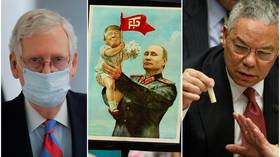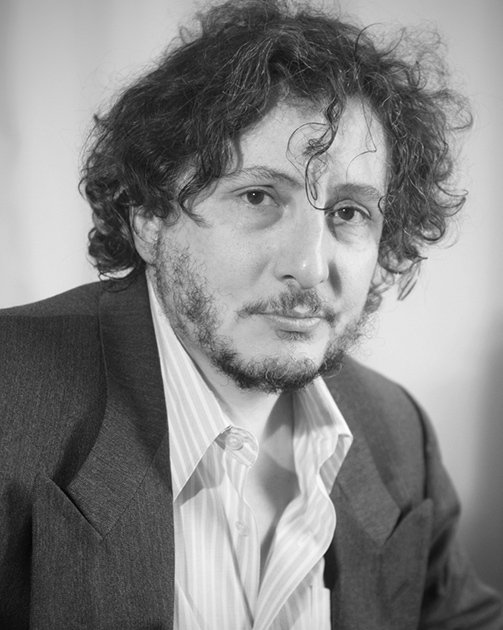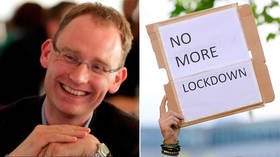Covid-19, Russiagate, Iraq – politicians are too happy to defer to convenient ‘experts’

So-called “experts” are too narrow in their focus and too often wrong in their judgments to be able to decide the sorts of life-and-death issues a nation’s political leaders are asked to decide.
If “War is too important to be left to the generals,” as Georges Clemenceau, (France’s prime minister during World War I) claimed, then foreign policy is too important to be left to the intelligence agencies, and public policy is too important to be left to the scientists.
From the start of the Covid-19 pandemic, politicians and media fell over themselves in their rush to defer to the “experts.” Apparently, it was up to scientists to decide whether a country should shut down its economy and keep its citizens locked up in their homes in perpetuity. It was up to scientists to determine whether a country can, if ever, resume normal life. As for the consequences — economic depression, exploding national debt, lost businesses and means of livelihood, growing alcoholism and drug abuse, rise in suicides, spiraling untreated medical problems — those are things the public would just have to live with, because there could be no second-guessing of the scientists.
Also on rt.com Shock at low US confidence in Trump’s coronavirus narrative ignores decades of governments abusing Americans’ trustScience, a mantra against Trump
President Trump has been one of the few political leaders to attempt, on occasion, to question scientists’ judgments, and to suggest that political leaders shouldn’t cede policymaking to unelected experts.
Such temerity elicited spluttering rage from the media. ‘Trump’s Response to Virus Reflects a Long Disregard for Science,’ ran the headline of a typical New York Times story:
As the nation confronts one of its worst public health disasters in generations, a moment that demands a leader willing to marshal the full might of the American scientific establishment, the White House is occupied by a president whose administration…has diminished the conclusions of scientists in formulating policy.
‘Pandemic Brings Trump’s War on Science to the Boil’ was the headline of a recent Guardian article. Trump’s political opponents are also on board with ceding policymaking authority to the scientists. Presumptive Democrat nominee Joe Biden urged Trump to “Listen to the scientists. Listen to the doctors. Listen to what they have to say.” A few days later, in response to Trump’s refusal to wear a mask, Biden declared, “It’s important to follow the science, listen to the experts, do what they tell you.”
No one has championed the cause of “science” as fervently as House Speaker Nancy Pelosi. “Science is our key to unlocking our country. The last thing we need is political interference into science,” she announced in a recent tweet. Next day’s tweet stated, “What we must do — what science tells us we must do — is focus on expanding testing & contact tracing. That is the only way we can safely reopen our economy.” Asked by CNBC’s Jim Cramer when Americans could start going back to work, she resorted to what has become her familiar standby: “So, again, data, data, data, evidence, science. That is the answer to when we can go back.” On Fox News, she dismissed Trump as a “weak leader” because, bizarrely, he hadn’t ceded policymaking to the scientists: “And that might have been OK before, but we cannot continue down a path that is, again I’ll come back to science, science, science, evidence, data on how we should go forward.”
Not an exact science
What’s strange about this worship of the scientists is that their track record during the pandemic has hardly been impressive. The Imperial College model had predicted 2.2 million deaths in the United States and 510,000 in Great Britain. The supposedly anti-science Trump administration had taken the Imperial College model seriously and, as the New York Times admitted, the model “influenced the White House to strengthen its measures to isolate members of the public.” Imperial College’s Neil Ferguson then reversed himself and announced that UK deaths from the disease may not exceed 20,000. Interestingly, Ferguson cited the UK’s lockdown policy to explain his abrupt reversal. As Alex Berenson pointed out, the UK had instituted the lockdown only two days before Ferguson’s announcement, and lockdowns need at least two weeks to take effect. And ultimately, the UK’s death toll has already topped 30,000, so that prediction was wrong, as well.
The Institute for Health Metrics and Evaluation’s model didn’t fare much better. In early April, when the White House was citing predicted numbers of 100,000 and 240,000 deaths, it predicted there would be 147,000 deaths by August. That estimate has since been revised more than twofold – first to 135,000, and now to 147,000. Downward or upward, the point is that while politicians are incessantly telling other politicians to “listen to scientists,” the scientists are all over the place. Until there is at least universal agreement on how to tally the death numbers, namely, whether deaths with the coronavirus are to be counted separately from, or jointly with, deaths from the coronavirus, many of these numbers will remain in the realm of speculation.
The saints of Russiagate
Let’s take a look at another set of experts whose findings have been allowed to shape public policy. There is no group of experts with a worse record than the intelligence agencies. The catastrophic 2003 invasion of Iraq was in large part based on their finding that Iraq possessed weapons of mass destruction.
Then there was the January 2017 Intelligence Community Assessment, which flatly claimed:
We assess Russian President Vladimir Putin ordered an influence campaign in 2016 aimed at the US presidential election. Russia’s goals were to undermine public faith in the US democratic process, denigrate Secretary Clinton, and harm her electability and potential presidency. We further assess Putin and the Russian Government developed a clear preference for President-elect Trump.
The intelligence agencies to this day have presented no conclusive evidence to support these claims. Yet politicians (even conservative politicians) and media (even conservative media) accept them as true and denounce as unpatriotic any attempt to call them into question. Any policy toward Russia other than total hostility — including repeated sanctions, provocation and preparation for armed conflict — was deemed unacceptable.
What politicians are for
Serious confrontation with a nuclear superpower is fraught with risk, and any US president would be derelict in his duties if he didn’t do everything in his power to avoid it. At a minimum, he should check whether the intelligence he had been fed was as solidly based as its producers claimed.
Also on rt.com Does Trump know his own government indirectly bankrolls some key promoters of the ‘Russiagate’ hoax?In Helsinki, during his July 2018 summit with President Putin, President Trump, acting with the responsibility his office requires, decided it was not in the interest of the US to pursue confrontation with Russia. Rather than accuse Russia of election interference, Trump expressed some skepticism as to the definitiveness of the US intelligence agencies’ findings. Media and political operatives rained denunciations on his head.
“Trump’s statements amounted to an unprecedented refusal by a US president to believe his own intelligence agencies over the word of a foreign adversary,” screamed CNN. “Millions of Americans will continue to wonder if the only possible explanation for this dangerous and inexplicable behavior is the possibility…that President Putin holds damaging information over President Trump,” declared Senator Charles Schumer (D-N.Y.). “I wonder if the Russians have something” on Trump, mused former Director of National Intelligence James Clapper. Former CIA Director John Brennan flatly accused Trump of “treason.”
Since then, of course, the intelligence agencies’ claims have unraveled in spectacular fashion. Special Counsel Robert Mueller failed to “establish that members of the Trump Campaign conspired or coordinated with the Russian government in its election interference activities.” The US government abandoned its two-year-long prosecution of a Russian company that had supposedly orchestrated a social media campaign to interfere in the 2016 election. Recently released House Intelligence Committee transcripts reveal that intelligence chiefs that had shot their mouths off on television about Trump-Russia admitted under oath that they had never personally seen any evidence of it. Most damagingly, Shawn Henry, president of CrowdStrike, admitted to having no conclusive evidence that it was the Russians who stole the DNC emails.
The Russian interference in the 2016 election story will soon be as discredited as the Iraqi WMDs story. The experts made claims that everyone needed to accept and that policymakers needed to act upon. As with the recommendations of the scientists, political leaders would have been better advised exercising their judgment rather than blindly following the experts. It’s what voters expect their leaders to do.
Like this story? Share it with a friend!
The statements, views and opinions expressed in this column are solely those of the author and do not necessarily represent those of RT.














